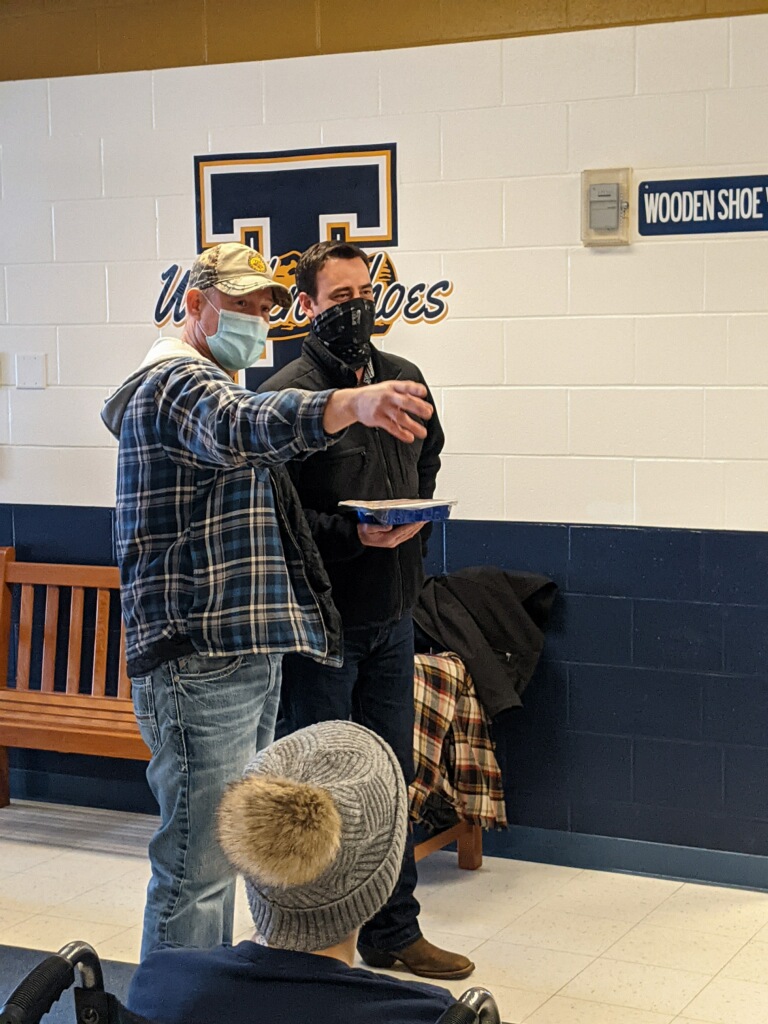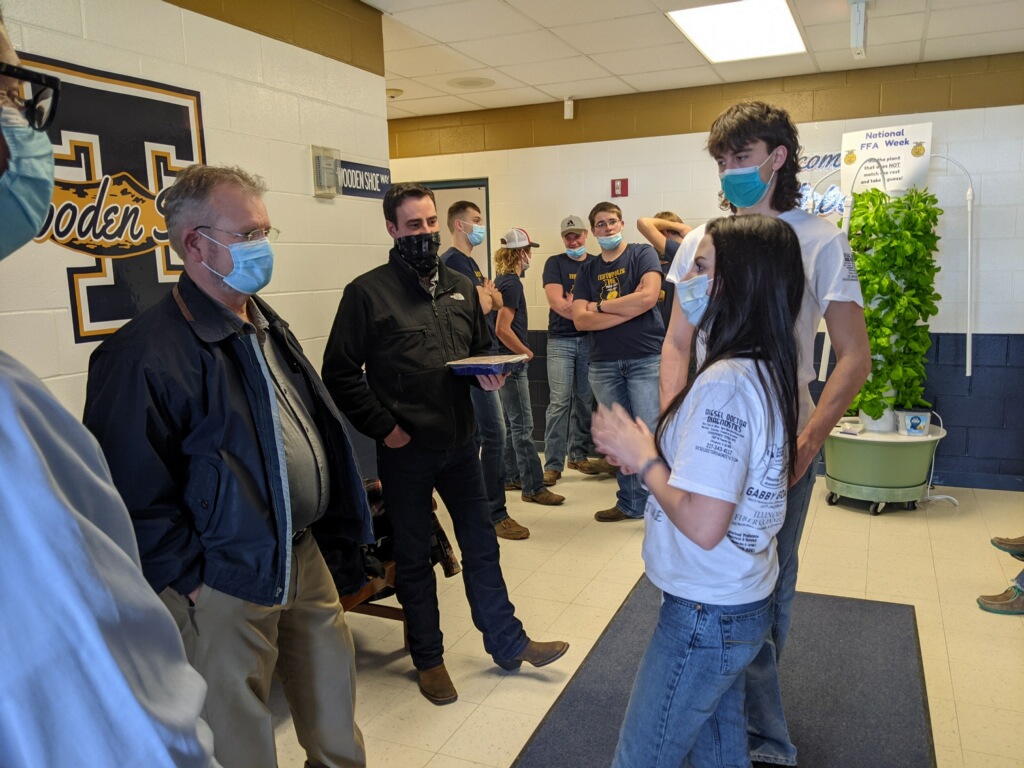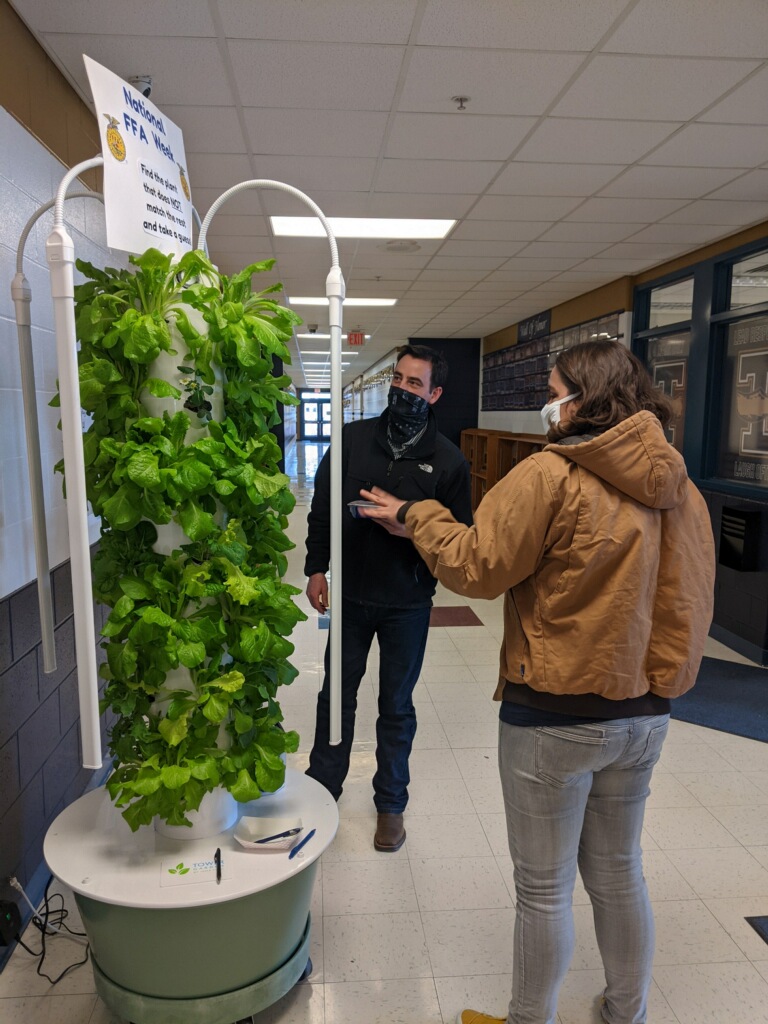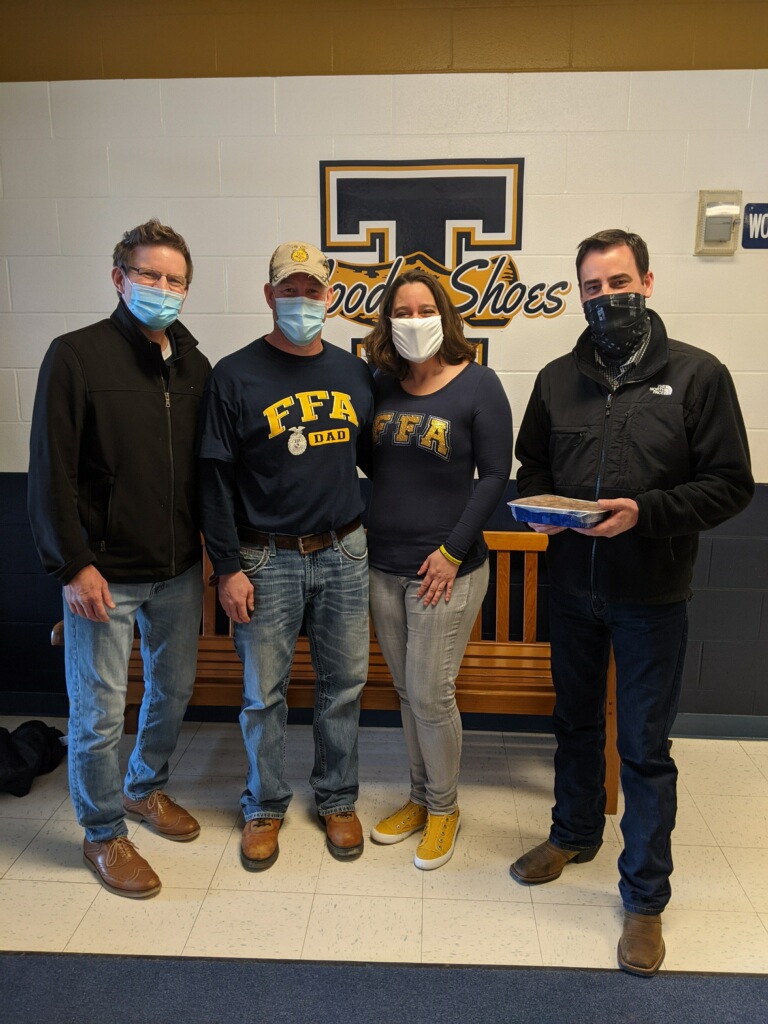Teutopolis Junior High School hosted the FFA Event on Feb. 26, 2021 as part of the National FFA Week program. FFA is a national organization that promotes agriculture education and leadership development in young men and women. The Teutopolis Chapter of FFA includes students from Effingham High School because there is not a chapter there.

Pictured with State Rep. Blaine Wilhour (center) are FFA students (l-r): Jeff Deters, Nate Thompson, Ethan Kremer, Blake Mersman, Cole Probst, Elizabeth Weidner, Ethan Weidner, Kadie Corley, and Gavin Hoene.
Agriculture is part of our daily lives—from the food we eat to the clothes we wear. This week, more than 760,000 FFA members across the country will share the story of agriculture as part of National FFA Week. The National FFA Organization is a school-based, national, youth, leadership development organization of more than 760,000 student members as part of 8,700 local FFA chapters in all 50 states and Puerto Rico.
National FFA Week always runs Saturday to Saturday and encompasses Feb. 22, George Washington’s birthday. This year, the week kicks off on Feb. 20 and culminates on Saturday, Feb. 27.

Please support these FFA groups in the 107th District:
Today, FFA provides the next generation of leaders who will change the world. As the top school-based youth leadership development organization in the nation, FFA helps young people meet new agricultural challenges by helping members develop their unique talents and explore their interests in a broad range of career pathways. FFA members are our future leaders, our future food-suppliers, our future innovators and so much more!


Whether it is through service projects or community gatherings, National FFA Week is a time for FFA members to raise awareness about the role the National FFA Organization plays in developing agriculture’s future leaders and the importance of agricultural education.
The National FFA Board of Directors designated the weeklong tradition, which began in 1948, in recognition of Washington’s legacy as an agriculturist and farmer. A group of young farmers founded FFA in 1928, and the organization has been influencing generations that agriculture is more than planting and harvesting — it involves science, business and more.
National FFA Week is a time for FFA members to share agriculture with their fellow students as well as their communities. Chapters also give back to their communities through service projects during FFA Week. For example, during FFA Week, the Cleveland FFA chapter in Minnesota will be hosting a supply drive for the local humane society. In Arkansas, Clarksville High School FFA will be reviving the old community garden. Richland High School FFA chapter in North Carolina plans to organize a food drive and Wheatland FFA in Montana will be building park benches. These are just a few examples of how FFA members will be living to serve in their communities.
During FFA Week, the six national FFA officers will connect virtually with chapters across the country – delivering keynotes, greetings, workshops and more!
National FFA Week is also a time for alumni and supporters to advocate for agricultural education and FFA. Alumni and Supporters will celebrate Alumni Day on Tuesday, Feb. 23, and on Thursday, Feb. 25, the National FFA Foundation will celebrate Give FFA Day, a 24-hour campaign encouraging the public to support various needs impacting FFA members. If interested in giving, one can visit FFA.org/GiveFFADay. Friday, Feb. 26, all FFA members and supporters are encouraged to wear blue and show their FFA pride!
National FFA Week will be featured on social media as well. Follow the #FFAweek hashtag on Facebook, Twitter and Instagram and don’t miss @NationalFFA Facebook, Twitter, Instagram and Snapchat posts.
Agricultural education has a long and rich history in Illinois, although organized efforts to foster agricultural education for all students did not begin until the 1980s. In 1984, a grassroots movement from the Illinois agriculture industry recognized that agriculture is central to the welfare and economic stability of the state, and requires a continued source of trained and qualified individuals for employment in agriculture. That movement resulted in creation of the Illinois Leadership Council for Agricultural Education (ILCAE).
In 1986, the Illinois General Assembly legislated that a comprehensive program for agricultural education be created and maintained by the public school system for all school districts. The Illinois Committee for Agricultural Education (ICAE) was formed. In 1987, the first agricultural education line item within the Illinois State Board of Education budget was approved at $48,500. When the line item was increased to $1,000,000 in 1989, the Facilitating Coordination in Agricultural Education Project (FCAE) was developed by the Illinois State Board of Education to assist in the coordination of improvement and expansion efforts in agricultural education. The current funding level for the agricultural education line item is $5,000,000.
How can you help?
Support our local program, educators and students by encouraging our schools to maintain and enhance agricultural education opportunities and ask state legislators to increase agricultural education line item funding. Share the message that agriculture is the state’s number one industry and top employer, and raise awareness of the diverse career opportunities available in the agriculture and horticulture fields.
Agricultural Education is an integral part of the Illinois School Code. (Control F, type in FFA, click next to view) Classroom instruction, FFA membership, and Supervised Agricultural Experience(SAE) are required for funding.
Agricultural Education has a solid track record. The program has experienced a steady increase in the number of students in high school agricultural/horticultural education programs and FFA. 91 percent of students are non-farm students, 40 percent are female, and 7 percent are minority. It serves more and more student high school graduation needs. 80 percent of the departments allow agriculture courses to fulfill high school graduation requirements in academic areas of science, consumer education, math, language arts, and social studies. More than 70 percent of agriculture’s graduating seniors enter postsecondary education.
Approximately $4000 in state incentive funding is awarded annually to each local program to purchase state-of-the-art equipment and curriculum materials. Incentive funding has saved many agricultural programs from closing. Online curriculum with more than 1200 agricultural lesson plans have been developed and are provided free of charge to Illinois agricultural teachers. The curriculum resources aligned to Illinois Academic Learning, Standards are now used in 42 other states and the curriculum has been adopted in its entirety in 14 states.
